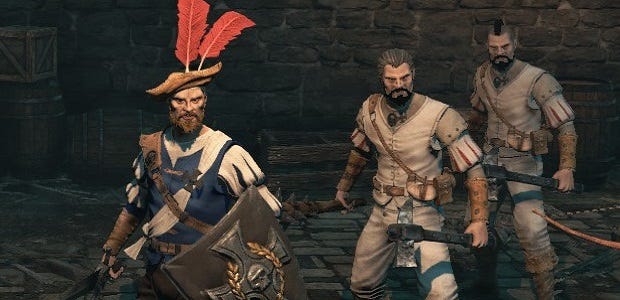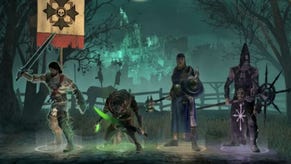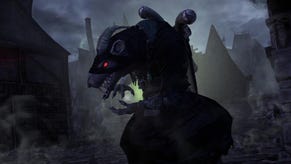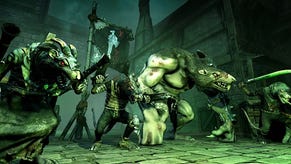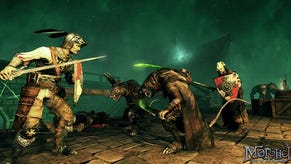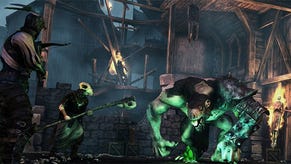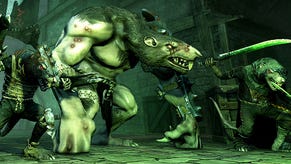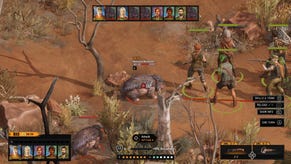Wot I Think: Mordheim - City Of The Damned
Damned if you do
Hi! How are you? Are you having a good December? It’s almost Christmas. That’s probably something to be excited about, I suppose. I tell you something that’s not worth being excited about, and that’s Mordheim [official site]. Probably don’t get anyone Mordheim for Christmas. I’m going to explain why and to try to remain cheerful, but every time I write about or think about Mordheim's idiot enemies, I just get angry. Imagine this paragraph coming at you through a clenched smile. ARE YOU READY? JOLLY GOOD.
Mordheim is set in Mordheim, which is a city in the Empire, one of the nations that makes up Games Workshop’s fantasy/horror spin on renaissance Germany. In Mordheim (and hence in Mordheim), you command a warband made up of not-very-grizzled mercenaries who loot the many spoils of this warped and ruined city, battling with rival warbands like vultures cawing over a corpse. This gradually grizzlifying experience slowly transforms them from sappy simpletons into, hopefully, seasoned and cynical warriors of the highest calibre.
These men (there are pretty much no women, unless you choose to play as The Cult of Crazy Women) learn from each and every fight, carrying forward both experience but also injury, while collecting all sorts of equipment and paraphernalia in that same magnetic fashion we would expect in every fantasy setting.
And I hate it.
Mostly, anyway.
There are a number of reasons for this. A number of them! I’m smiling at you. My teeth are only a little clenched. Only slightly agrind.
The thing I hate most is probably how stupid the opponents I fight are. Your warband might be half a dozen fighters, or it may be a few more as, with time, you unlock more slots for more warriors. Your opponents are of a similar number. Of those (say) six enemies you cross paths with in some ruined back alley somewhere, four might run at you, one might seemingly get stuck on a street corner and do nothing, and another might stand there and let your archers pummel him with arrows until, like the most melancholic bouncy castle, he succumbs to all this pricking and lets the life fart out of him, collapsing into himself.
This doesn’t always happen. I want you to know that the enemies don’t always stare at you silently across open ground, turn after turn. Sometimes the enemy really does want to press an advantage they have and will finish one of your ailing men (or Crazy Women), rather than wandering off to pick up something shiny they saw. Sometimes they come at you in numbers, which is the best way to win a fight, or indeed a battle.
You see, Mordheim rarely has you fighting to the death. A downed warrior isn’t necessarily a dead one and you usually need only knock out two or three of the enemy before the rest of them rout. So move in groups, gang up, target one or two people at a time and your odds of success are good. Actually, because your opponents aren't smart enough to follow your example, your odds of victory are excellent. Every time. Rinse. Repeat.
Another thing I hate is the staccato combat. Mordheim’s Bavarian brothers aren’t the teutonic knights of old, they’re the wooden, staggering figurines that parade out of a Black Forest cuckoo clock. While they might run around with at least a little grace, might swing their weapons with all the energy you’d expect, the fights they find themselves in are tit-for-tat affairs where one side stabs, then the other side stabs, then the first side stabs again.
There’s no fluidity to these encounters, there’s only people locked in place by zones of control who then take turns to roll dice and see if they’ve hit something. There aren’t exciting choices about how to swing, or greater risks for greater rewards, there’s simply a stab or thrust and then the hope that you’ll dodge or parry when the same comes back at you.
This can continue for a while, even as a mighty hero (one of the game’s specific classes) strikes a wiry Skaven (Warhammer’s excellent rat-people) with his two-handed sword (a very big weapon). I have never seen a two-handed sword look less effective than when it is swung into the same person’s torso five rounds in a row, and don’t even get me *started* on ranged weapons. Combat in Mordheim rarely feels lethal and often looks languid. You could achieve a similar effect equipping everyone with pillows, plushies and pool noodles.
All these fighters act according to their position on the initiative carousel, which twirls through each in turn. The lightly-armoured tend to go first, while those you have stacked with heavier gear and multiple weapons will wait, stock-still, as everything else unfolds around them. Yes, this is the way of turn-based combat, but Mordheim allows you to run around within your movement limits, creating the sense of a world in stasis rather than a world in waiting.
A swig of a potion or the occasional nasty injury can confuse the initiative order, but otherwise every fight has a clockwork feel. A step. A stab. A step. A stab. A riposte. Repeat. Again, your best tactical options are found in anything that gives you weight of numbers rather than clever decisions or reactions, though the additional gradual attrition from a few arrows can also help. It’s unexciting. It’s uninspired.
All this is one side of a coin, though it’s a side I’ll return to again. On the shinier side, the side that caught your eye and first made you reach down to the cobbles, Mordheim also has a substantial campaign that links all these many awkward battles together. The spoils of victory can be draped upon your warband or sold to pay their wages, while you also accumulate wyrdstone, the game’s magical currency, which can be shipped off to win the favour and furnishings of various factions. There’s a lot more to the game in this department, as it soon becomes apparent that there are a great many skills that can be unlocked, warband advancements waiting to be enjoyed and, of course, magic items that can be exploited.
This being the Warhammer world, magic tends to have its downside. Those potions you drink, for example, may cause more than just indigestion. Or they might not! Who knows. That, at least, is a chance for you to enjoy some risk for reward, rather than just rolling a die to see if something does or doesn’t work.
It can’t be overstated how elaborate this campaign side of the game is. Point by point, you can increase the mental and physical characteristics of your recruits, also watching as serious injuries penalise them for life. Some die. Some don’t. All are changed forever, each of them growing into very distinct individuals as your campaign progresses, every one a unique and beautiful flower (or, as perhaps suits Warhammer, a bulbous mushroom). You will, however, have to make the effort to customise all their clothes. They arrive as if they slid straight out of a photocopier.
Yes, it’s often interesting stuff. Your team is forged in battle, but truly shaped between skirmishes. It’s just a terrible shame that those skirmishes are often so silly and quickly become formulaic. While they often start with very different pretexts, such as your squad scattered by some event, or caught on the back foot, they so often play out the same way. There are frequently side-quests or additional objectives on offer, but there’s never much point in fulfilling these, particularly not the ones where you’d have spend turn after turn scouring a level to collect unremarkable treasures.
And that’s assuming that you even have the chance to explore. Because the enemy charges for you even if they’re outnumbered, they're likely to engage in another fight to the death even if they don’t stand a chance. Turn by turn, they roll to hit, they stab, you roll to hit, you stab, and then another battle is over after two enemies rush, fall and then the rest elect to rout. Maybe it’s all a little faster this time, as you have better weapons and warriors, doing incrementally more damage. Maybe you’ll be less bored. I wasn’t. I hated it.
There are other things you may or may not hate. You certainly should hate the long loading times, as I definitely bought a new, top-of-the-range PC with a sexy SSD to enjoy three minute loads between repetitive battles. You may well also hate how, when moving your warband about, they have a habit of getting caught on scenery. You may hate how familiar all that scenery quickly starts to look. You may hate the bizarre default key bindings (middle mouse to bring up the map?). You might well also hate the smug tone of the narrator, especially as he soon starts to repeat himself between battles, but your mileage my vary. I don’t know. Perhaps you like smug people.
I shouldn’t have to now qualify my opinion by saying that I grew up a big fan of Warhammer, particularly Warhammer Fantasy, but this game could well have seriously appealed to my personal bias, reaching out to that bias, stroking it, whispering in its ear and asking it if it wanted to quit this joint, to go get a drink, to head back home for warpstone and chill. There I was, all ready to get excited about leading a team of Warhammer warriors through hell and horror, but all Mordheim does is reduce fights to routines.
It’s saved somewhat by multiplayer. Your warbands can be teleported out of the campaign and into fights with other humans, humans nowhere near as dim as the game’s AI, humans able to make decisions that go beyond just charging forward. Against real people, Mordheim can be a game of hiding and of ambushes, it’s maps suddenly full of danger and surprise, of bait and switch. A warband so engaged can gain both injuries and experience, or simply fight in a showcase match, returning to your PC as if nothing had ever happened.
But if you were hoping for a new squad-based game with the finesse of XCOM, or the many tactical choices of Jagged Alliance 2, this is not it. Mordheim is dumb. Mordheim is flawed. Mordheim tries hard and doesn’t succeed. This is not a happy Christmas, everyone, but the misshapen horror of Faschnat. It’s your present from Krampus.
Mordheim: City of the Damned is available now.
